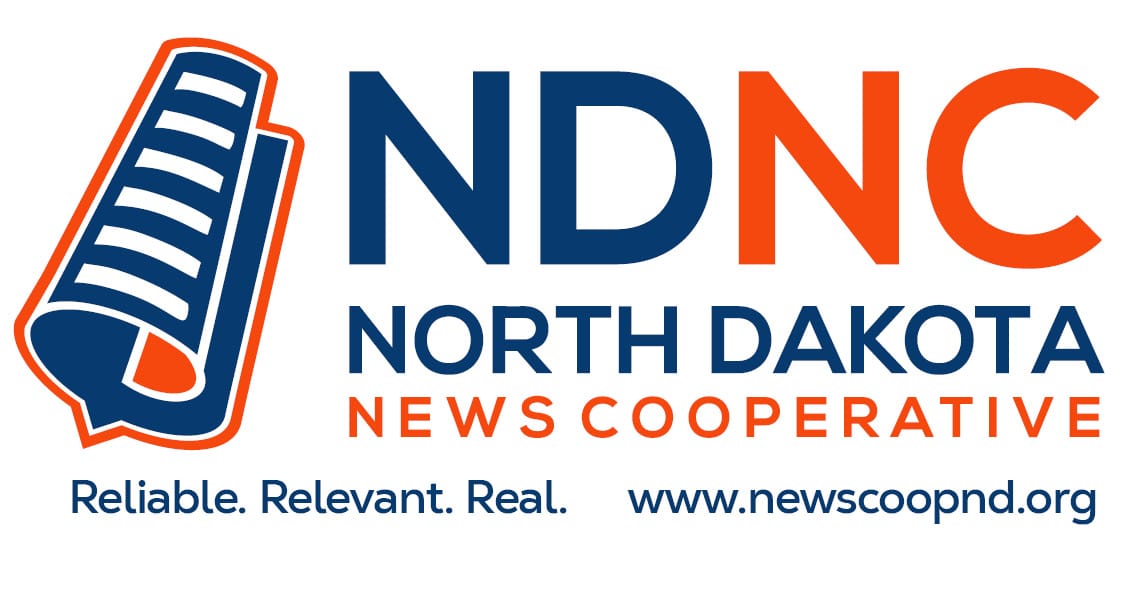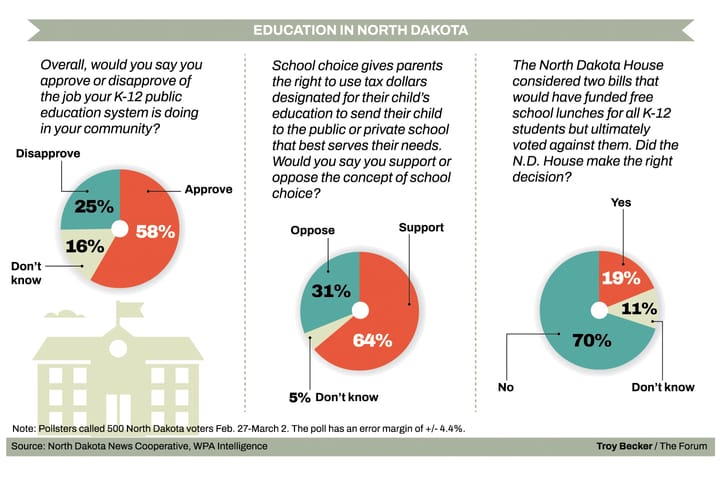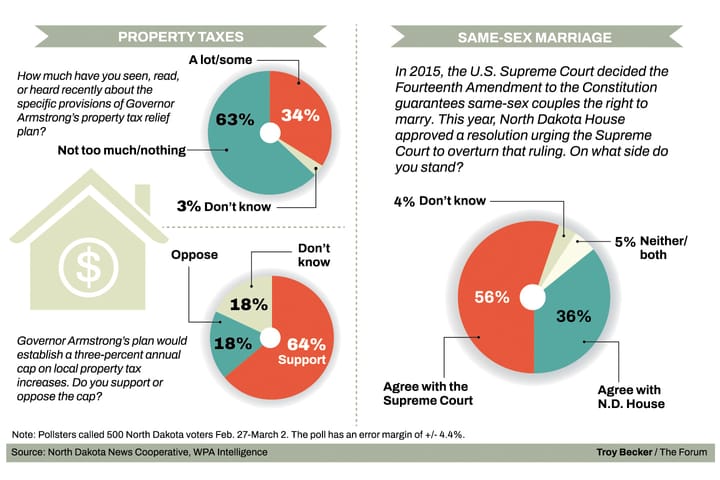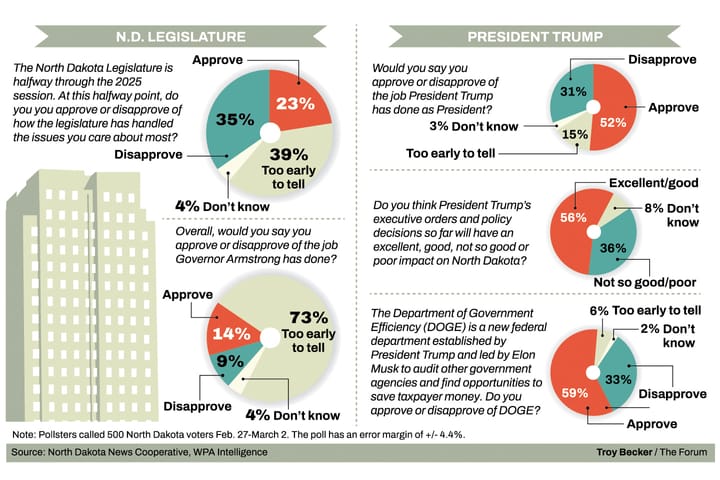Carbon capture potential hot button issue for 2024 election cycle
Around 40% of voters unsure whether it will reduce effects of climate change
Political decisions on carbon capture are making strange bedfellows in North Dakota.
From environmental rights activists on the left, to property rights advocates on the right, a motley coalition has formed to push back against efforts to build a pipeline to pump CO2 from ethanol plants across the Midwest to store deep below the ground in central North Dakota.
A new North Dakota Poll released Feb. 20 found that only 16% of eligible voters in the state believe capturing carbon dioxide will reduce the impacts of climate change. Another 40% are unsure, and 27% believe it won’t work. The poll was conducted by WPA Intelligence in Washington, D.C for the North Dakota News Cooperative.
Looking ahead toward the election cycle in November, the questions around whether it is an appropriate climate change solution and whether North Dakotans support CO2 pipelines and other efforts to capture and store carbon dioxide, appear set to become even more contentious.
Rick Becker, former state legislator and a candidate in the Republican primary for North Dakota’s only congressional seat in June, said the figures show people don’t agree upon or understand the purpose of the CO2 pipeline.
“If they understood that it is about storing carbon in an effort to reverse global warming, then this poll would indicate that they would not be favorable to the pipeline,” Becker said.
Curt Stofferahn, chair of the Dakota Resource Council, which opposes the Summit Carbon Solutions pipeline, said he’s had a variety of political persuasions come to DRC meetings about it.
Worries range from pipeline safety concerns for local communities, to liability concerns from farmers of the pipeline crossing their land, to the potential use of “eminent domain for private gain,” he said.
“We’ve got a wide variety of people coming to us, saying ‘Where’s my political party? How come they’re not opposing this?’” Stofferahn said.
According to the poll, which surveyed 500 eligible North Dakota voters, only 8% of Republicans, 16% of Independents and 36% of Democrats believe capturing and storing carbon dioxide underground will reduce the effects of climate change.
Those numbers come as the North Dakota Industrial Commission – represented by the governor, attorney general and agricultural commissioner - is in the process of deciding to award $300,000 to a public relations firm to help promote the capture, storage and use of carbon dioxide in the state.
The funds were appropriated by the 2023 Legislature, with $100,000 each coming from the Lignite Research Council, Oil and Gas Research Council, and the Renewable Energy Council, which are funded from taxes on the oil and gas industry.
“The state elected officials and industry are in cahoots here and what we have is the state wanting to get this pushed forward,” Becker said of the decision to fund a messaging campaign.
Both Becker and Stofferahn said it comes down to tapping into 45Q tax credits. These are tax credits that incentivize the permanent storage of carbon dioxide at up to $85 per ton.
“The people that are promoting this are only doing because of the carbon tax credits,” Stofferahn said. “They don't care about climate change. They don't care about rural communities. All they want is the profit they can gain from these carbon tax credits.”
While the reasons are likely more nuanced than that, another potential point of confusion is the term carbon capture itself.
Carbon capture can refer to specific pipelines used to move carbon dioxide captured at ethanol plants, to capture at coal-fired power facilities such as the proposed Project Tundra at the Milton R. Young plant near Center, and a variety of other capturing techniques at industrial hubs, cement plants, and even direct air capture.
Ben Fladhammer, communications manager of Minnkota Power Cooperative, which operates the plant, said carbon capture and sequestration technology has a potential to emerge as a major industry in North Dakota but that it also needs increased educational initiatives since it is so new here.
“Our interactions with landowners and community members through Project Tundra have produced significant support, with over 97% of landowners voluntarily signing leases for CO2 storage beneath their properties in our primary storage area,” Fladhammer said.
“While there remains additional work to do statewide, our firsthand experience underscores the power of education in gaining support for this technology and its place in North Dakota’s future,” he added.
Summit Carbon Solutions did not respond to requests for comment on the carbon capture question for the poll by deadline.
Other candidates for North Dakota’s U.S. House seat – Democrat Trygve Hammer, and Republicans Julie Fedorchak and Tom Campbell either did not respond to requests for comment or were unavailable prior to the deadline for this story.
Lack of concern concerning
Another part of the poll found about 43% of eligible North Dakota voters believe climate change poses a threat to their future way of life. These numbers show a stark partisan divide with 87% of Democrats and 45% of Independents saying they are concerned, while only 26% of Republicans say the same.
Paul Jensen, secretary and treasurer of Citizens Local Energy Action Network in Fargo, said those numbers show him that people “don’t understand the seriousness of the situation.”
Jensen pointed out that the Midwest hasn’t had as much of the more catastrophic climatic impacts that other parts of the country have seen.
Record warm global average surface air and ocean temperatures are also on track to high all-time records, based on current trajectories.
“It’s not been up directly in our face, except for the Canadian wildfires last year that burned an area equivalent to the size of North Dakota,” Jensen said. “That was a major, major natural environment event that people could breathe in and actually get a taste for.”
Similar events, if they reoccur with more frequency in the Midwest, could bring those impacts closer to home.
Energy security is personal
Another aspect of the poll that will likely play out in upcoming elections is whether North Dakota’s elected officials can ensure reliable energy at the lowest cost for consumers around the state.
A total of 42% of all eligible voters polled said they have the highest levels of concern about future energy cost and reliability, with 23% extremely concerned.
Sen. John Hoeven, addressing that part of the poll, said the state needs to continue building energy resources for driving the economy forward, providing jobs, and ensuring national energy security.
“We need affordable, dependable energy that is available 24 hours per day, 7 days a week,” Hoeven said.
“North Dakota is an energy powerhouse for our nation utilizing both traditional and renewable energy sources, including coal, oil, gas, biofuels, wind, solar and geothermal,” Hoeven said.
The new North Dakota Poll surveyed 500 eligible and likely voters between February 4-6, 2024 and has a margin of error of +/- 4.4%. North Dakota News Cooperative is a non-profit news organization focused on reporting on topics that impact the lives of North Dakotans and promoting news literacy.
WPA Intelligence is a leading national provider of survey research, predictive analytics, and data management technology to assist in survey design, representative sampling, programming, fielding and data analysis.
The North Dakota News Cooperative is a nonprofit news organization providing reliable and independent reporting on issues and events that impact the lives of North Dakotans. The organization increases the public’s access to quality journalism and advances news literacy across the state. For more information about NDNC or to make a charitable contribution, please visit newscoopnd.org.



